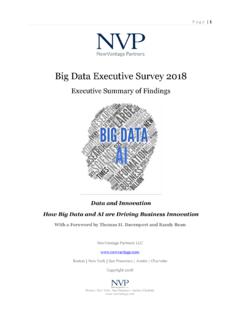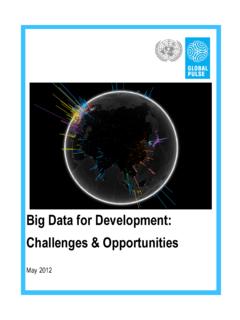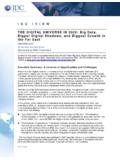Transcription of Assessing the Demand for Big Data and Analytics Skills ...
1 Assessing the Demand for big data and Analytics Skills , 2013-2020 April 2014 Assessing the Demand for big data and Analytics Skills 1 April 2014 Table of Contents Acknowledgements 3 Introduction to the Expert Group on Future Skills Needs 4 Foreword 5 Executive Summary 6 1. Introduction and Overview 29 Background 29 Aims of the Study 29 Approach and Methodology 29 Report Structure 30 2. big data and Analytics drivers of change 31 Overview: Defining big data and Analytics 31 Deriving value from big data and Analytics key drivers 31 Patterns of adoption and the power of small data 33 Driving big data and Analytics in Ireland 34 Potential constraints 35 Implications for Skills 36 3.
2 Existing employment Demand in data Analytics in Ireland 37 Approach 37 Existing employment Demand - findings from the literature review 37 Deriving an estimate for Ireland 40 The sectoral spread of employment 44 Baseline Demand 2013 45 4. big data and Analytics findings from the consultation 46 Introduction 46 Survey interviews with employers 46 Stakeholder Workshops 60 Key informant consultation 62 Concluding comment 63 5. Future Demand scenarios for big data and data Analytics 64 Introduction 64 Global big data and Analytics growth drivers and benchmarks 65 big data and Analytics growth scenarios for Ireland 67 Expansion, up-skilling and replacement Demand scenarios 72 6.
3 big data and Analytics Skills supply 85 Assessing the Demand for big data and Analytics Skills 2 April 2014 Overview 85 Supply of big data and Analytics talent findings from the literature 85 Skills supply in Ireland 87 Conclusions on Skills supply and matching with Demand 95 7. Policy measures in place domestic and international 97 Overview 97 The race for Analytics talent 97 Trends in international policy approaches 98 Initiatives in place in Ireland 100 8. Findings and Recommendations 102 Building up the supply of analytical talent : 102 Appealing to the broadest possible talent pool 106 Inspiring the next generation of Analytics talent 109 Measuring Progress 110 Supporting Actions: Unlocking the potential of big data and Analytics in the public sector 110 Conclusion 112 Appendix 1: Members of the Steering Group 113 Appendix 2: Terms of Reference 114 Appendix 3: Dedicated big data & Analytics Programmes 117 Appendix 4: Members of the Expert Group on Future Skills Needs 119 Appendix 5: Publications by the Expert Group on Future Skills Needs 2011-2014 120 Appendix 6.
4 Glossary of Acronyms 121 Assessing the Demand for big data and Analytics Skills 3 April 2014 Acknowledgements Forf s would like to record its appreciation to the members of the Steering Group who oversaw the progress and the development of the report for their significant commitment and contribution the membership is set out in Appendix 1. Forf s would like to thank the many industry executives, academics and staff at expert organisations and State Agencies who gave their valuable time and insights though interviews and at workshops. Forf s would like to acknowledge the high quality and expertise of EY and Oxford Economics whose work included the international trend analysis, the undertaking of the consultations with companies and key informants and the modelling of the big data and Analytics Skills Demand scenarios for Ireland contained in the report.
5 Assessing the Demand for big data and Analytics Skills 4 April 2014 Introduction to the Expert Group on Future Skills Needs The Expert Group on Future Skills Needs (EGFSN) advises the Irish Government on current and future Skills needs of the economy and on other labour market issues that impact on Ireland s enterprise and employment growth. It has a central role in ensuring that labour market needs for skilled workers are anticipated and met. Established in 1997, the EGFSN reports to the Minister for Education and Skills and the Minister for Jobs, Enterprise and Innovation. Forf s, Ireland s policy advisory board for enterprise, trade, science, technology and innovation in conjunction with the Skills and labour Market Unit in SOLAS, provides the EGFSN with research, analysis and secretariat support.
6 Assessing the Demand for big data and Analytics Skills 5 April 2014 Foreword This study undertaken by Forf s and the Expert Group on Future Skills Needs is a key input to the Government s Action Plan for Jobs 2013. Its aim is to research and identify measures to build up the big data and Analytics talent pool over the period up to 2020 in line with enterprise Demand . Measures required include improving domestic graduate output; continuing professional development; and where necessary attracting experienced talent from abroad-including expatriate talent. big data and Analytics is a relatively new area of business activity characterised by rapid growth. Globally, there is a reported shortage of data Analytics talent particularly individuals with the required deep analytical Skills .
7 At present, no one country or region stands out in the provision of data Analytics services. For Ireland to become a leading country in data Analytics services it is essential that our Skills capability base is sufficient to drive performance within existing enterprises, start-ups and new foreign direct investment. To understand how data Analytics Skills Demand may evolve, a number of scenarios were developed to depict potential future outturns. Government s policy into the medium-term is for Ireland to become a leading country in Europe for big data and Analytics . This would require achieving the scale of the ambition as set out in the high growth Scenario in this study. Under this Scenario, 21,000 potential job vacancies could arise from expansion and replacement Demand in the period up to 2020 - comprising 3,630 for deep analytical roles and 17,470 for big data savvy roles.
8 There would also be a further 8,780 potential job openings for supporting technology staff already included within the Demand forecast numbers for ICT professionals in the Forf s/EGFSN report on Addressing Future Demand for High-Level ICT Skills . The achievement of this outcome requires an improved understanding among private and public sector senior executives, of the potential of data Analytics for driving business performance - including its greater adoption in the SME sector. An enterprise-wide approach to managing data Analytics capabilities is essential including defining Skills needs; up-skilling of talent; providing clear career path progression and deploying analytical talent effectively to support business goals.
9 It is also essential for career guidance professionals and enterprises to communicate and raise awareness of the range of interesting career opportunities arising within data analytic businesses to students, particularly females, and to their teachers and parents. I would like to thank all those who contributed to the successful completion of the report. Particular thanks are due to the many enterprises and stakeholders who gave their valuable time and expertise to the study. I wish to express my thanks to Margaret Cox who chaired the Steering Group as well as to all members of the Steering Group for their full commitment and support. I would like to record my appreciation to the IDA Ireland and Enterprise Ireland for their support and sharing of expertise.
10 Finally I would like to thank the team at Forf s for leading this project to a successful conclusion. Una Halligan Chairperson, Expert Group on Future Skills Needs Assessing the Demand for big data and Analytics Skills 6 April 2014 Executive Summary Purpose and methodology This study, Assessing the Demand for big data and Analytics Skills in Ireland, 2013 - 2020, undertaken by Forf s and the Expert Group on Future Skills Needs (EGFSN) is a key input to the Government s Action Plan for Jobs 2013. The work includes Assessing the Demand (both expansion and replacement) for big data and Analytics roles and their related Skills , competences and qualification requirements and mapping out relevant current and planned education and training output.










